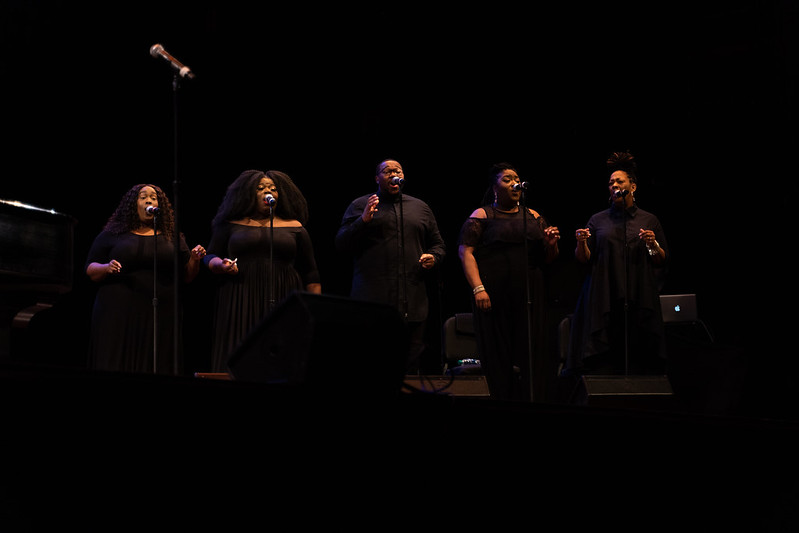On Tuesday night at the University of Massachusetts’s Fine Arts Center, Damien Sneed, a multi-genre recording artist and educator, performed “We Shall Overcome,” a showcase of African American music traditions that have inspired civil rights activists.
The production featured music from a range of genres that included gospel, classical, jazz, Broadway and spiritual, and featured music from artists such as Aretha Franklin, Stevie Wonder, Nina Simone and many more.
In between the gospel themed music, Sneed spoke about the vital social issues that were prevalent during the time of the music’s release. This included discussion around civil rights activist Reverend Dr. Martin Luther King Jr. and the background that lead to much of his nonviolent protest against inequality.
“During the civil rights era in the 60s and even today, the church is not just a religious institution, it’s more than that,” Sneed explained. “It’s a place where people find the faith to keep going. It’s a place where everyone is welcomed and none are excluded.”
In the 1950s and 60s, African Americans were fighting for equal rights to use the same diners, restrooms and buses as white people. Sneed looked to show the impact music and singing had during these fights for equality.
In moments throughout the showcase, the lights would be turned on, and the audience were invited to stand up and dance along. The diverse group of people that made up the audience stood together as they waved their hands, spun around and shouted the word “Freedom” in synch.
Later on in the production, Sneed connected the ensemble’s chosen compositions with cultural issues that extend further than race.
“101 years ago in 1919 there was a very important vote passed, and in 1920 the very first women utilized their newfound right to vote,” Sneed said in reference to the ratification of the 19th amendment in 1920, which gave women the right to vote in the U.S. This acknowledgment was met with a loud cheer from the crowd, and a rendition of Aretha Franklin’s 1967 songs “Respect” and “(You make me feel Like) A Natural Woman.”
According to the program given out during the event, Sneed has had a career as a “pianist, organist, conductor, composer, producer, arranger and arts educator”. He has worked as a musical director with countless artists such as Diana Ross, while also founding the Chorale Le Chateau gospel group.
In light of his successes, Sneed mentions he has also had a series of personal hardships he has needed to overcome.
“Dr. Martin Luther King Jr.’s message of overcoming doesn’t just deal with racial disparities or social injustice, but it’s also for people like me,” he explained. “I was adopted and for years I struggled with rejection. There was a time when I almost didn’t hold on and I had no faith that I could [reach my dreams.]
“Let me be your example that you can become whatever you want to become.”
The production concluded with the audience being invited to stand up and hold hands with the person to the left and right of them as King’s 1968 speech “We Shall Overcome” was played. The audience listened closely as King’s 1968 “We Shall Overcome” speech was played.
“We shall overcome. We shall overcome. Deep in my heart I do believe we shall overcome. And I believe it because somehow the arc of the moral universe is long, but it bends towards justice,” could be heard as the audience held hands with one another.
For freshman psychology major Dorothy-Jean Munafo, her favorite part of the showcase was when the audience stood up to dance.
“I liked being involved in the show rather than just watching, and it was fun to dance with strangers who I normally would not have the chance to interact with.”
Kamari Weaver is a Collegian contributor and can be reached at [email protected].



















